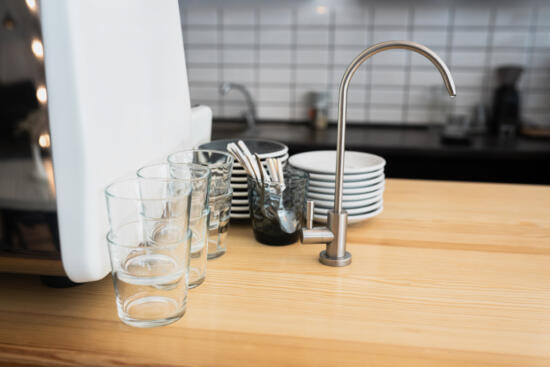Water is the essence of life, but not all water is created equal. When it comes to the water in your home, you want it to be clean, safe, and pleasant to use. To achieve this, there are various water treatment systems available, ranging from countertop water filters to whole house water filtration systems. Each offers unique benefits, and understanding their differences can help you make the right choice for your home.
Countertop Water Filters vs. Water Softeners
Let’s begin by comparing countertop water filters with water softeners. Although they may seem similar, they serve distinct purposes.

Water softeners primarily focus on transforming hard water into soft water by removing hard minerals like calcium and magnesium. This process is beneficial for preventing the build-up of limescale residue on your appliances, bathtubs, sinks, and other surfaces. These systems are typically installed on the main water pipeline entering your house.
However, water softeners aren’t designed to provide drinking water. They simply convert hard water to soft water from your main water source. Plus, there’s a good chance that other contaminants could remain in your water even after softening.
On the other hand, countertop water filters specialize in removing various contaminants, potentially improving the taste and quality of your drinking water. If you want the benefits of both a water softener and a countertop water filter, you might need to consider pricier options that can perform both functions.
Countertop Water Filters vs. Under Sink Water Filters
Now, let’s move on to comparing countertop water filters and under sink water filters. As their names suggest, their key difference lies in where they are installed.
Under sink water filters, depending on the model, may have their own special faucet for dispensing filtered water or can utilize your existing faucet. One advantage they hold over countertop filters is their speed—they tend to filter water more rapidly.
Furthermore, with the aid of reverse osmosis, under sink filters can efficiently remove contaminants. They’re also a popular choice for those who prefer a clutter-free kitchen counter as they are out of sight and don’t take up valuable space.
However, the convenience comes with a trade-off. Installation can be complicated, and you may need to hire a professional plumber to ensure it’s done correctly.
Countertop Water Filters vs. Whole House Water Filters
Next, let’s contrast countertop water filters with whole house water filters. Whole house filters are installed at the mainline, close to where it enters your house, serving as the primary filtration source for your home’s entire water supply.
This means every faucet, every appliance using water, and even your showers and toilets are supplied with filtered water. The comprehensive coverage is the most significant advantage that whole house water filters have over other types.
Given their heavy-duty function, these systems can also provide soft water and remove a broad range of contaminants, ensuring that everyone in your home enjoys clean, safe water throughout the house.
Countertop Water Filters vs. Water Pitchers
Lastly, let’s examine the difference between countertop water filters and water filter pitchers. Water filter pitchers are portable filters with built-in filtration systems. They don’t need to be connected to any water source but require frequent refilling.
These handy filters are budget-friendly, with prices ranging from $30 to $80, and replacement filters costing between $15-25. They can be carried anywhere and stored in the refrigerator, adding to their convenience.
However, remember to not store the water for more than a day. After that, it needs to be replaced and refilled.
In Conclusion
Choosing the right water treatment system for your home involves a careful examination of your needs, budget, and preferences. Each type of filter system has its pros and cons.
Countertop water filters are great for purifying your drinking water, whereas water softeners can protect your appliances and surfaces from limescale buildup. However, to enjoy both benefits, you may need a system that combines these functions.
Under sink water filters offer a neat solution without taking up countertop space and provide rapid filtration, but their installation might require professional help. On the other hand, whole house water filters ensure every water outlet in your home dispenses filtered water, but they come with a higher price tag.
And finally, water filter pitchers are a budget-friendly and portable option, but they require frequent refilling and may not provide the same level of filtration as other systems.
Remember, the perfect water filtration system is the one that fits your unique needs and lifestyle. So take the time to assess your requirements and make an informed decision. After all, the quality of your water impacts not only your health but also the longevity of your appliances and the cleanliness of your home.

Jay
Jay is a health and wellness enthusiast with expertise in water quality and nutrition. As a knowledgeable advocate for holistic well-being, Jay successfully manages Type 2 Diabetes through informed lifestyle choices. Committed to sharing reliable and authoritative insights, Jay combines firsthand experience with a passion for enhancing health."
